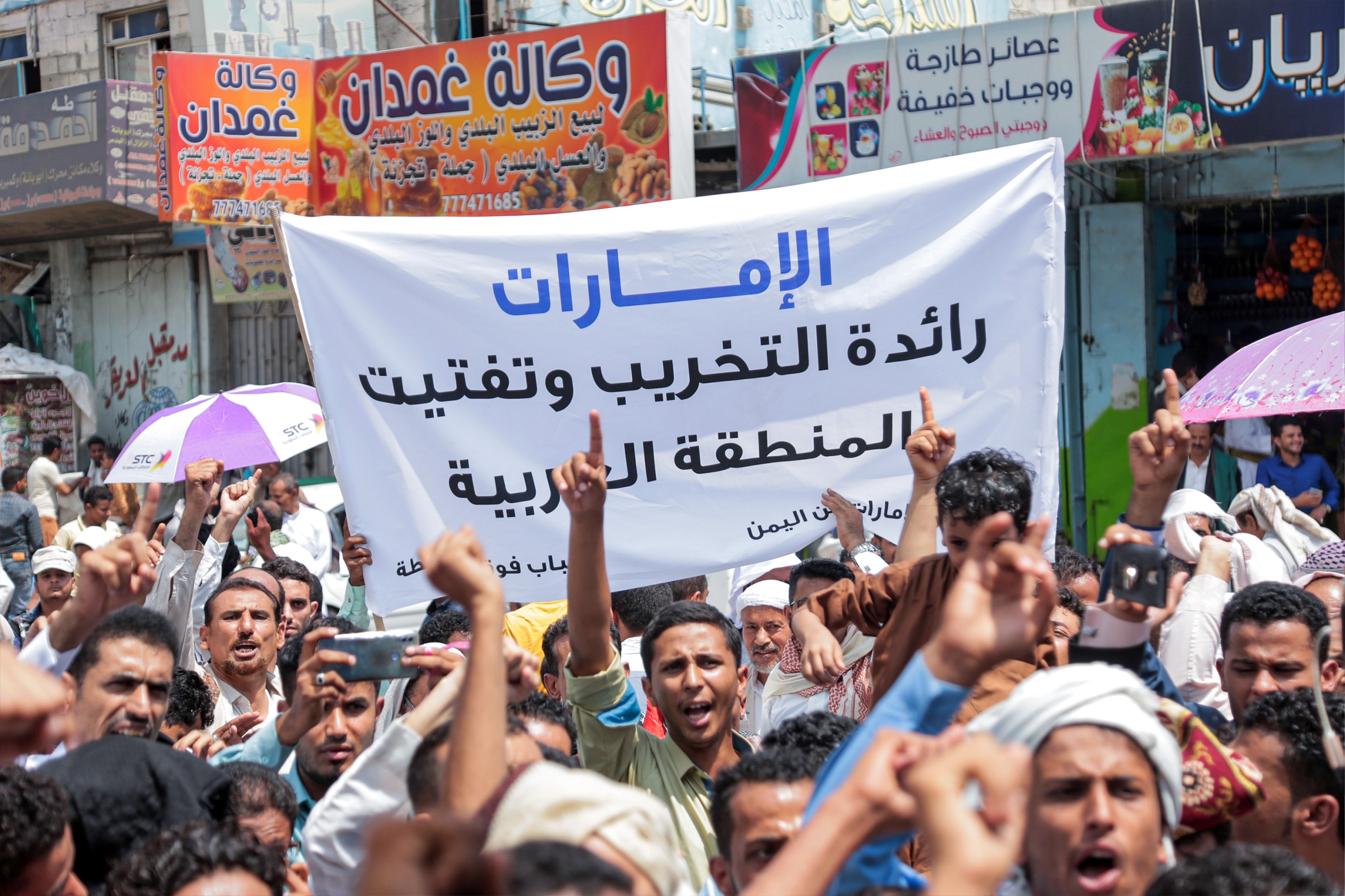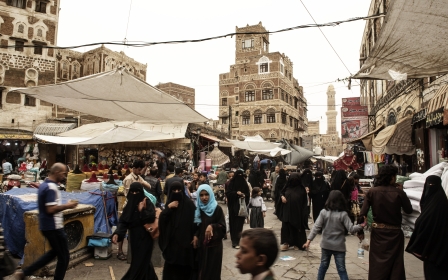UAE’s support for separatists stokes resentment against Saudi Arabia

Ahmed Mozahem, 43, used to work as a supervisor in a pharmaceutical factory in Sanaa before it closed down, forcing him to move around in search of work. Such was the price he had to pay as a consequence of war.
After Houthi rebels took over the capital in 2014, he decided to leave for his home city of Taiz where he worked as a shopkeeper before moving again. This time, he went to Aden to work at an ice factory.
Mozahem said he had welcomed the Saudi-led intervention against the Houthis when they ousted President Abd Rabbuh Mansour Hadi from Sanaa. He hoped that the coalition would bring Yemen back to the way it was and the factory would reopen.
“The Saudi intervention gave Yemenis a glimmer of hope that their country could be taken back from the Houthis, but they are losing hope day after day,” Mozahem told Middle East Eye.
Fighting between nominal allies within the Saudi-led alliance, which has been ongoing since early August, has opened a new battlefront in Yemen, away from the front lines with Houthi rebels.
Tension between coalition members Saudi Arabia and the United Arab Emirates (UAE) has been high since UAE-backed separatists, led by the Southern Transitional Council (STC), fought Saudi-backed pro-Hadi forces and seized the city of Aden, the interim seat of Yemen’s internationally recognised government.
“I used to respect Saudi Arabia and trusted it when it intervened in Yemen, but I did not like its silence against the UAE’s support for the STC in the south.”
'We hope that the Saudis would announce the coalition’s withdrawal from Yemen'
- Ahmed Mozahem, civilian
The STC, established by Brigadier Aidarous al-Zabidi in May 2017, aims to restore the independence of south Yemen, which united with the north in 1990.
The UAE backed southern separatist fighters with air strikes on government forces as they tried to recover Aden, forcing them to withdraw.
The separatist council presently controls the provinces of Aden, Lahj, al-Dhale, and large parts of Abyan; and they are trying to advance to new areas.
Reports by local officials and residents in Aden said the STC has also expelled many northerners residing in Aden to nearby Houthi-held areas.
Mozahem said many Aden residents are not happy with Saudi Arabia’s stance as they believed that the kingdom would intervene if any member failed to adhere to the coalition’s stated objectives for its intervention in Yemen.
“We all know that the UAE supported the STC’s move to exile northerners from Aden, to fight the army, to take over public institutions, and create chaos in Yemen,” he said.
In response to the STC’s attack against pro-government forces, Riyadh released a joint statement with the UAE calling on their respective allies in Yemen to halt military action in the south.
Mozahem said that through the statement, Riyadh sought to show it is still in control of the situation and that the UAE acts under its leadership.
“This means that either Saudi Arabia welcomed the UAE’s violations in Yemen or that it cannot say no to the Emiratis, while Yemenis remain the only victims of this ongoing war,” he said.
“We hope that the Saudis would announce the coalition’s withdrawal from Yemen.”
Only an internal solution
Mohammed Sami, a lawyer based between Aden and Taiz, said that supporting a militia against the military is a clear violation of international law and Saudi Arabia must take action.
“Every country looks for its own interests, including members of the coalition in Yemen. Therefore, Yemenis should not wait for a solution to come from Saudi Arabia,” Sami said, adding that the kingdom has been losing support among Yemenis because of the Emirati backing of the STC.
Sami said he believes that unless Yemenis sit together to solve their own issues without Riyadh’s involvement, the disputes will only go deeper and a solution will not be attained.
“Our leadership is stuck in Saudi Arabia and we hope the president and his government can liberate themselves and return Yemen to solve its problems.”
Hadi has been based in Riyadh since the Houthis overran the capital.
Hadi’s failures
Meanwhile, some Yemenis, especially those whose relatives work in Saudi Arabia, believe that Riyadh is not wrong, for it was Hadi who had asked them to intervene against the Houthis.
“Many people criticise Saudi Arabia, but they shouldn’t. The Saudis did not invade us. They only came after we appealed for help… they helped liberate many areas from the Houthis,” said Salah Ghallab, 34, a resident in Aden whose brother Younes works in Saudi Arabia.
Ghallab said Hadi is responsible for any failure or success that takes place in Yemen and not the Saudi-led coalition or any other country.
'If the president cannot rule the country, Yemenis should take to the streets and demand that he resign or return to Yemen'
- Salah Ghallab, civilian
Hadi had called on Saudi Arabia to stop the UAE’s support for the STC, but the situation on the ground has not changed, nor has the alliance between Abu Dhabi and the separatists.
“If the president cannot rule the country, Yemenis should take to the streets and demand that he resign or return to Yemen, for he is responsible for us and not Saudi Arabia.”
Ghallab said he is grateful for Saudi Arabia as there are currently hundreds of thousands of Yemeni expatriates working in the kingdom, with each one of them helping more than one family in Yemen.
Vital remittances
As the conflict and resulting economic crisis have pushed scores of Yemenis into unemployment and a lack of job prospects, remittances from Yemeni expatriates have become increasingly vital for citizens.
The Ministry of Planning and International Cooperation estimated that remittances from expatriates in 2017 reached 25 percent of the GDP per capita.
“Yemeni expatriates in Saudi Arabia have played a main role in reducing the suffering of hundreds of thousands of families in all Yemeni governorates,” Ghallab said.
In 2016, remittances sent by Yemeni workers in Saudi Arabia amounted to 61 percent of total payments transferred to Yemen by expatriates, according to a Sanaa Center study.
“We should not deny that in the middle of this war, Yemenis are still able to leave Yemen and go to Saudi Arabia.”
However, Riyadh has been on a Saudisation drive of its private sector, a policy it launched in 2011 to lower the rate of unemployment and limit the recruitment of foreign workers.
Saudi Arabia's plan to widen the scope of occupations and business activities to be nationalised by next year would have a dire impact on Yemen’s economy because over 70 percent of Yemeni workers in the kingdom will be at risk of losing their jobs after 2020, the Sanaa Center reported.
Middle East Eye propose une couverture et une analyse indépendantes et incomparables du Moyen-Orient, de l’Afrique du Nord et d’autres régions du monde. Pour en savoir plus sur la reprise de ce contenu et les frais qui s’appliquent, veuillez remplir ce formulaire [en anglais]. Pour en savoir plus sur MEE, cliquez ici [en anglais].





